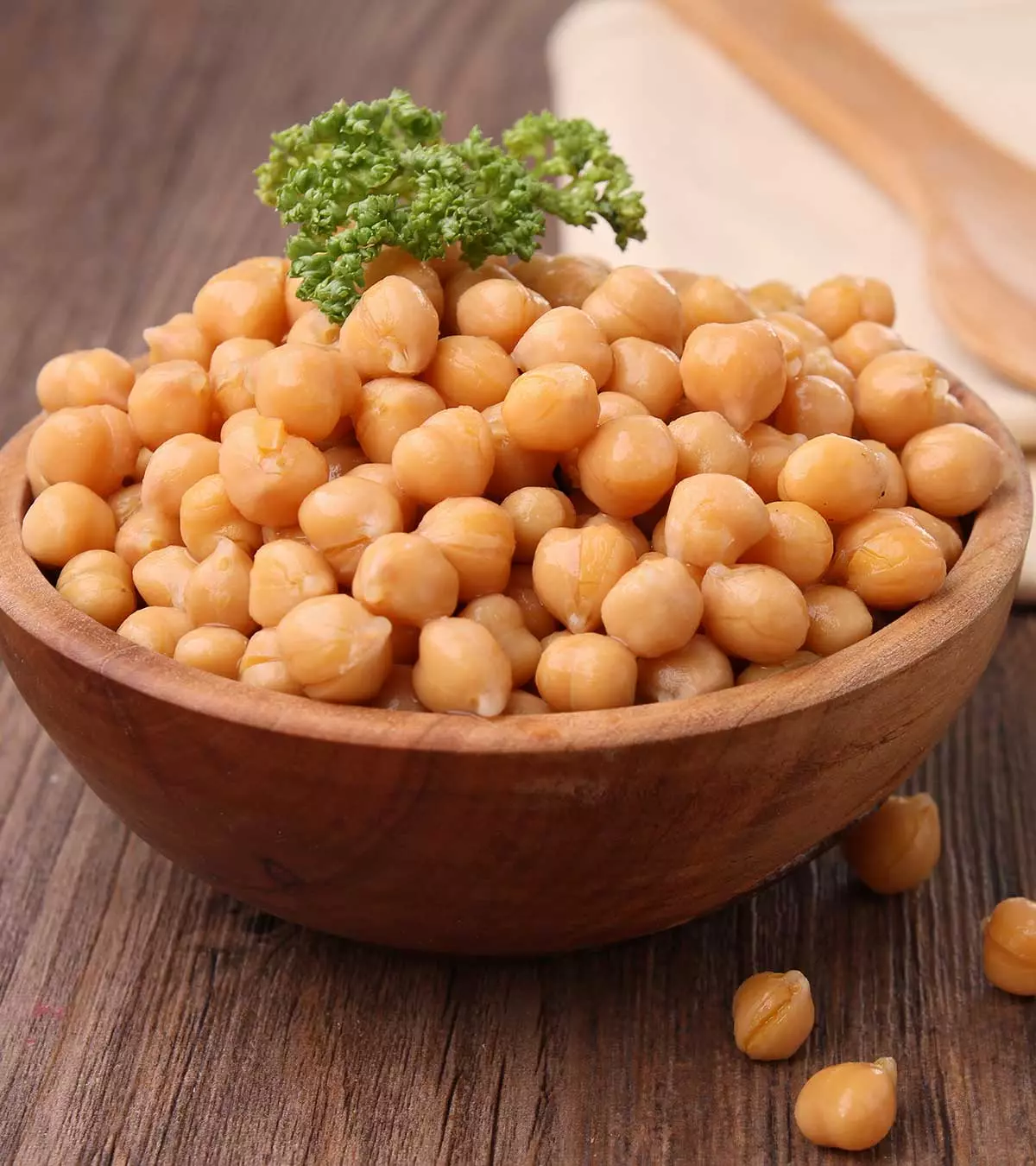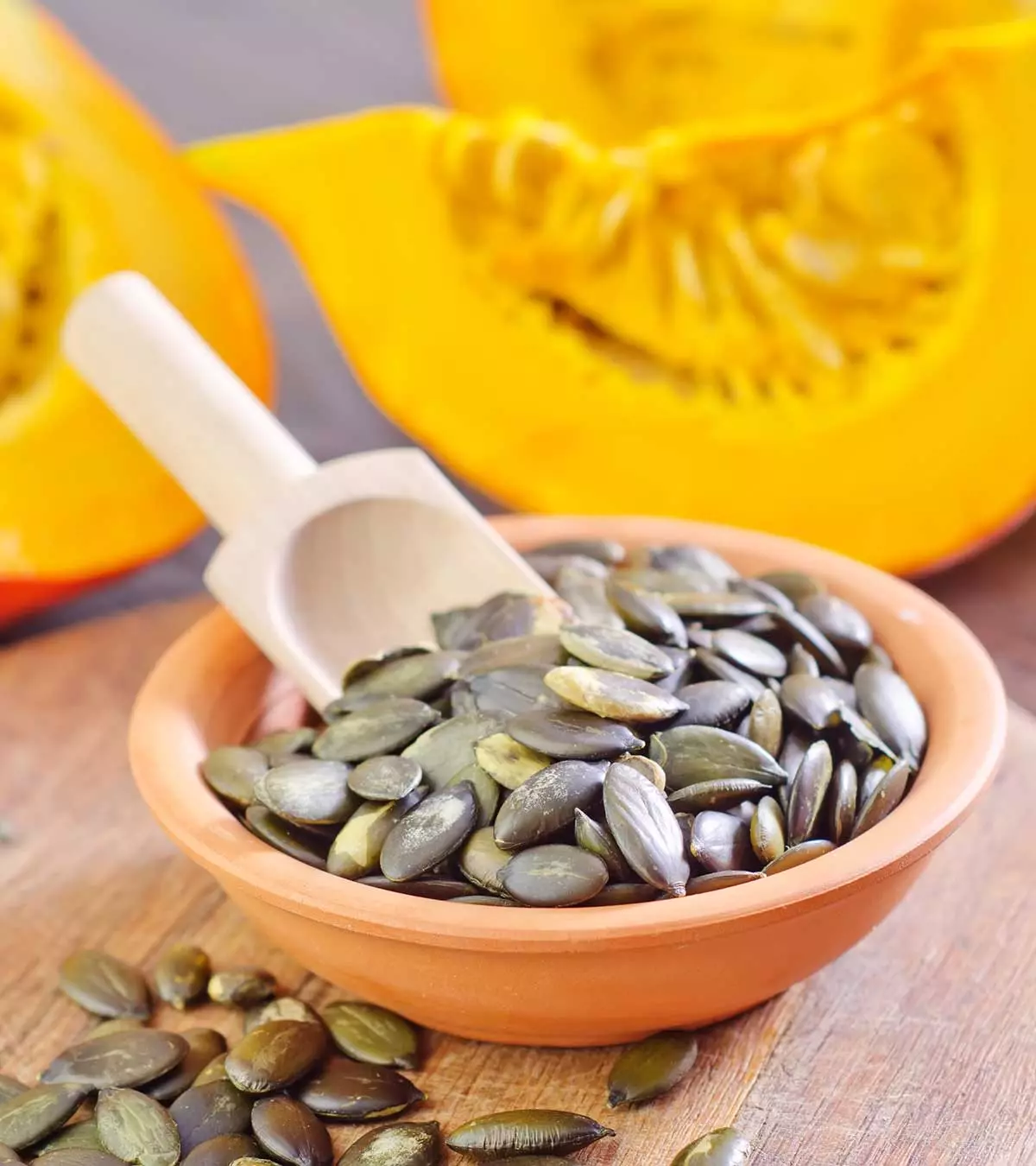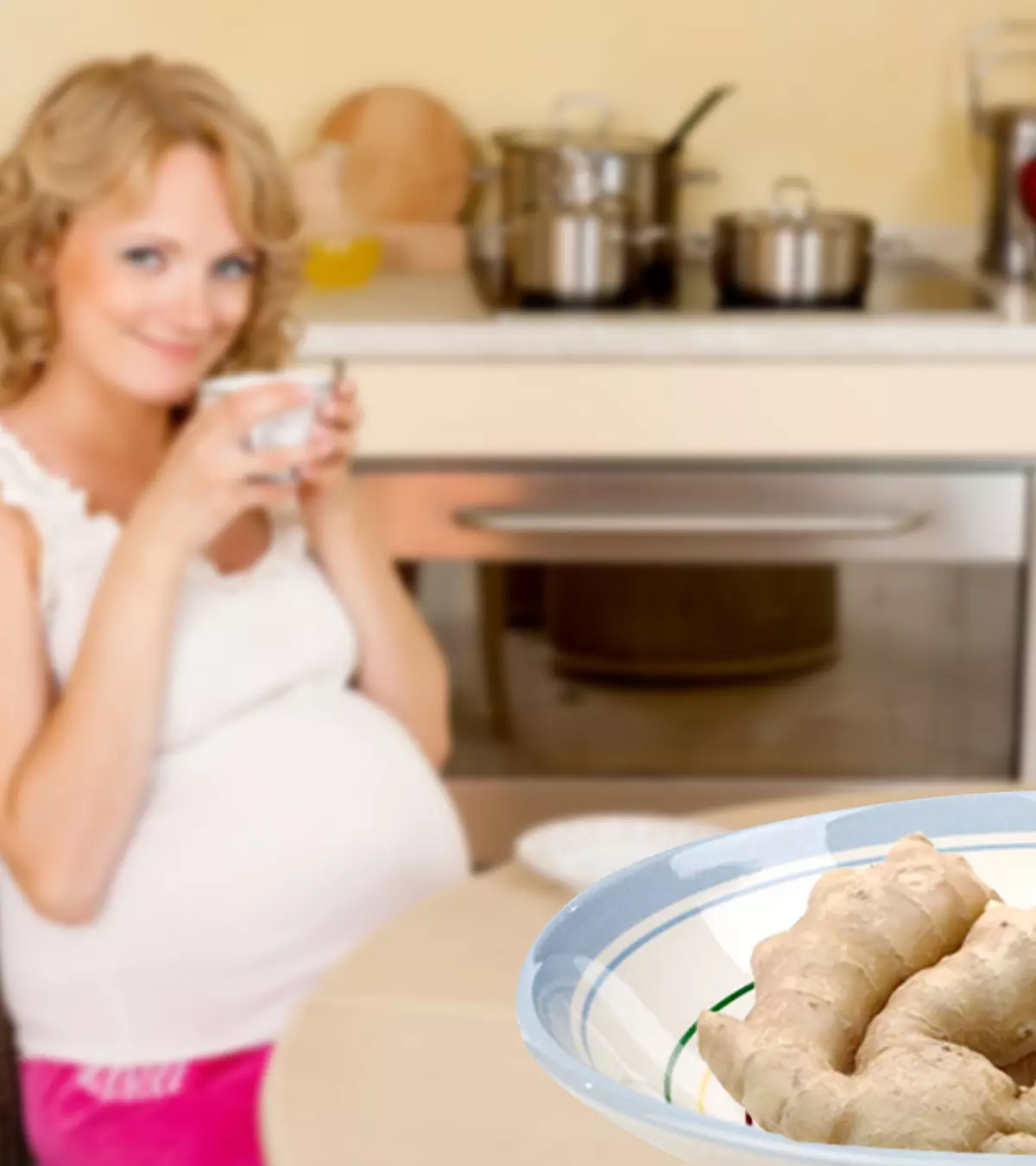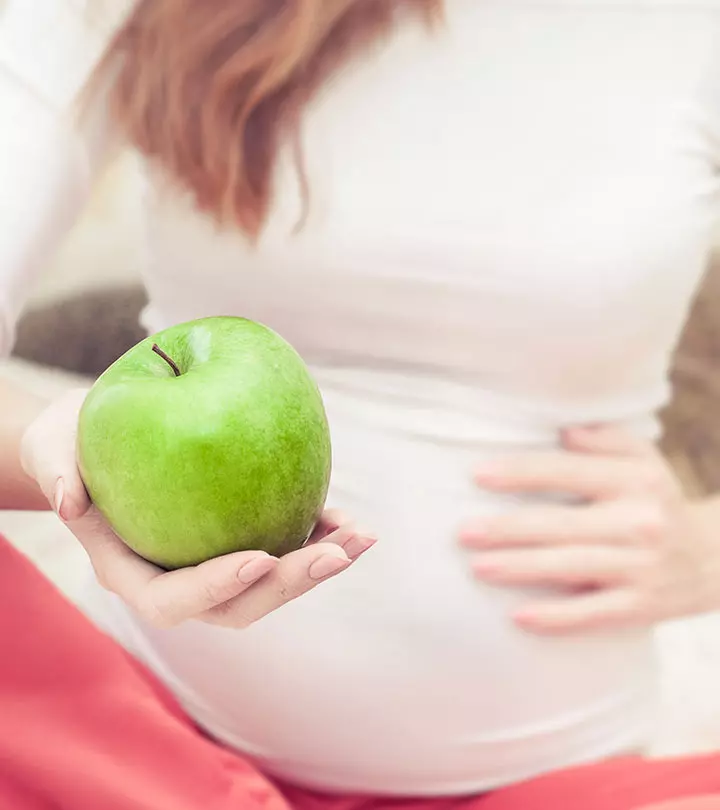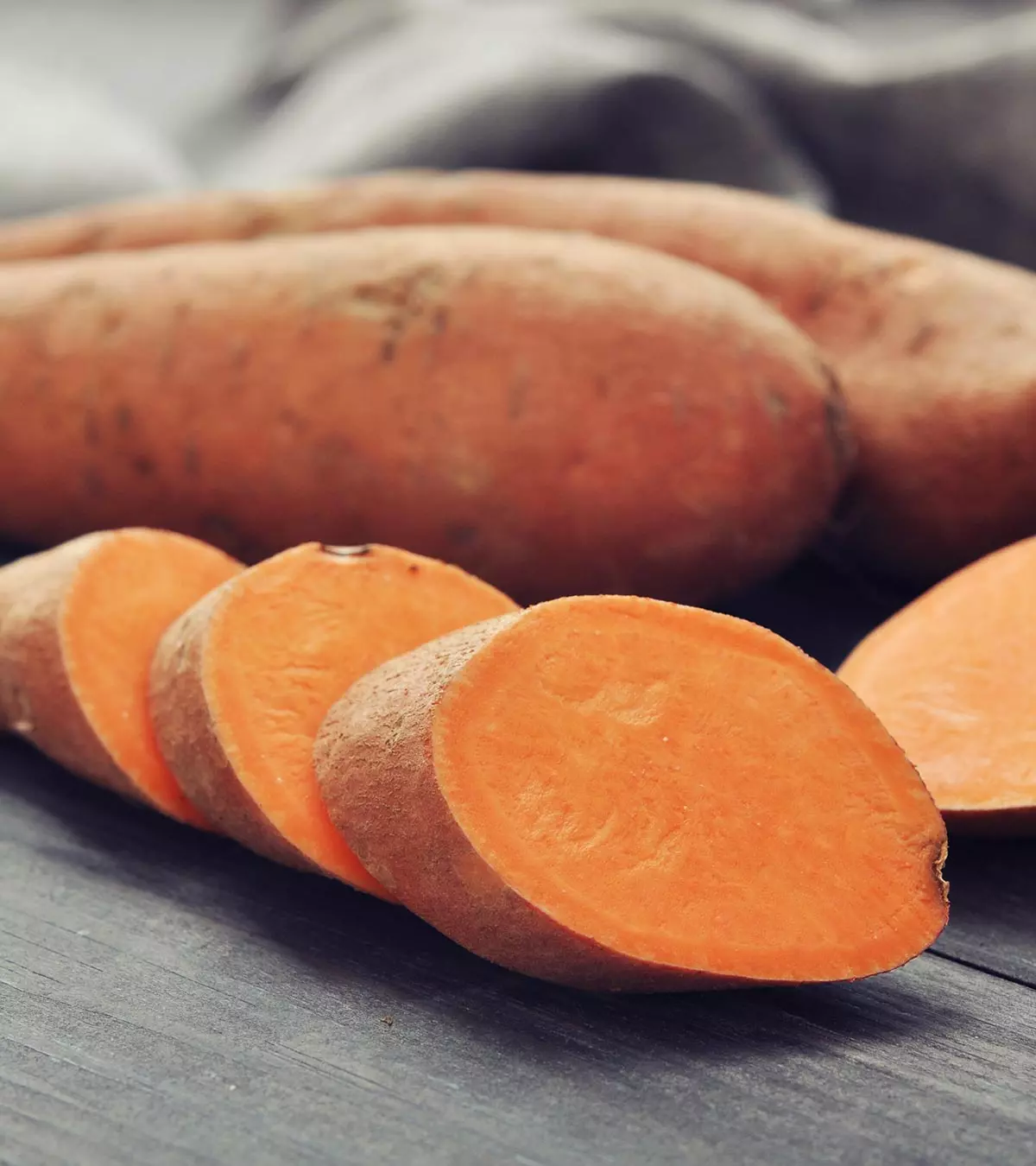
Image: Shutterstock
Parents consider adding sweet potatoes to their baby’s weaningiA gradual process of a baby switching from breastfeeding to other specific sources of nutrition like solid foods diet. Sweet potatoes are rich in carbohydrates and also provide beta-caroteneiA natural dye that gives color to fruits and vegetables and gets converted into vitamin A in the human body . They are rich in several nutrients needed for the baby’s healthy growth and development, such as calcium, potassium, vitamins A, B-complex, C, and fiber (1).
Sweet potatoes have a soft texture, and their naturally sweet flavor appeals to babies instantaneously. Combining sweet potatoes with other vegetables can be a great way to encourage healthy eating habits in babies, particularly if they tend to avoid or dislike certain vegetables. In addition, the soft texture of the vegetable makes it easy to process into nutritious baby food.
You must also select and store sweet potatoes properly to ensure healthy consumption for the baby. In this post, we answer all your queries about how to make sweet potato baby food, feed them to babies, and also provide some sweet potato baby food recipes.
Key Pointers
- Sweet potatoes are a nutritious food option for babies during the weaning process.
- Their soft texture and sweet flavor could be appealing to babies.
- Babies can have well-cooked sweet potatoes starting at six months of age.
- Sweet potatoes are high in carbohydrates, fiber, vitamins, and minerals.
- Sweet potatoes also contain bioactive compounds that can help to strengthen a baby’s immune system.
- Sweet potatoes may be combined with other vegetables such as carrots and peas to prepare baby food.
When Can Babies Have Sweet Potato?
Most babies can safely consume well-cooked sweet potatoes as a lump-free puree or mash from six months of age (2). Boiling, baking, roasting, and stir-frying are some ways you can make sweet potato recipes for your baby.
You will also be introducing other vegetables into their diet as finger foods. Therefore, introduce one vegetable at a time to ensure the baby responds well to that particular vegetable. If the baby refuses to eat sweet potato, give it a break and reintroduce it after a week or two in a different format.
Sweet potatoes are high in carbohydrates and vitamins that are important for your baby’s growth. They also have other health benefits.
Health Benefits Of Sweet Potato for Babies
Sweet potato is a tuberous root vegetable consumed in various parts of the world.
It is different from potato, but the two are distantly related, thus the similar-sounding names. Fundamentally, sweet potato and potato are unique with different nutritional values. Here are the major health benefits of a sweet potato for babies:
1. Vitamin A and beta-carotene
Sweet potato is an amazing baby food that comes packed with vitamin A which is needed for the healthy development of the eyes while it also has a lot of beta-carotene, a compound that synthesizes into Vitamin A in the body. Sweet potato thus has an incredible 14187 units of Vitamin A (3). That makes it a vegetable with one of the highest overall concentrations of Vitamin A making it an ideal solid food for your growing baby.
2. Starch and fiber
Sweet potato is a good source of starch and dietary fiber. Generally, half a cup of sweet potato (65g) can offer babies 8.2g of starch and 1.99g of fiber (4). The body breaks starch into sugars and uses it as energy. Dietary fiber helps digestion, adds bulk to the diet, and keeps gastric issues, such as constipation, at bay (5).
 Research finds
Research finds3. Contains multivitamins
It is not just vitamin A but there are other several vitamins present in sweet potato viz. vitamin C, E, K, and vitamin B1 to B6 and B9 ( 4). A steady supply of these vitamins is required to support healthy baby development, formation of various vital organs, and attaining developmental milestones on time.
4. Presence of important minerals
Sweet potato is a source of nearly all essential minerals the body needs, namely calcium, iron, magnesium, phosphorus, potassium, sodium, and zinc. Intake of nutrients, such as calcium, phosphorus, and magnesium, can contribute to developing and strengthening the baby’s bones. On the other hand, nutrients such as iron and vitamin B6 could help prevent anemia.
5. Contains bioactive compounds
Sweet potatoes contain several antioxidantiMan-made or natural substances that may prevent or slow down cell damage caused due to harmful molecules called free radicals properties and health-promoting effects present, found in plants and some foods” ] that possess antioxidant, anti-inflammatory, and anti-bacterial properties (6). The combined effects of these nutritional and phytochemical compoundsiBioactive compounds found in plant-based foods that act as antioxidants and have antimicrobial effects could contribute to strengthening a baby’s immune system.
Here is the nutritional chart that breaks down the quantity of these nutrients in 100 gm of sweet potato (4) (7).
Nutritional Value Per 100gm Of Sweet Potato
| Nutrient | Unit Value Per 100gm | RDA (7-12 months) |
| Energy | 86kcal | – |
| Carbohydrates | 20.12gm | – |
| Fiber | 3gm | – |
| Protein | 1.57gm | 11g |
| Calcium | 30mg | 260mg (AI) |
| Iron | 0.61mg | 11mg |
| Magnesium | 25mg | 75mg |
| Phosphorus | 47mg | 275mg (AI) |
| Potassium | 337mg | 860mg (AI) |
| Sodium | 55mg | 370mg (AI) |
| Zinc | 0.30mg | 3mg |
| Vitamin C | 2.4mg | 50mg (AI) |
| Vitamin B1 (Thiamin) | 0.078mg | 0.3mg (AI) |
| Vitamin B2 (Riboflavin) | 0.061mg | 0.4mg (AI) |
| Vitamin B3 (Niacin) | 0.557mg | 4mg (AI) |
| Vitamin B6 | 0.209mg | 0.3mg (AI) |
| Vitamin B9 (Folate) | 11µg | 80µg (AI) |
| Vitamin A | 709µg | 500µg (RAE) |
| Vitamin E | 0.26mg | 5mg (AT) |
| Vitamin K | 1.8µg | 2.5µg (AI) |
*AI = Adequate intake – nutrient level assumed to ensure nutritional adequacy*RAE per serving = Retinol Activity Equivalent, 1 mcg RAE = 1 mcg retinol and 2 mcg beta-carotene*AT = Alpha tocopherol, 1 mg RRR-alpha-tocopherol = 2 mg all rac-alpha-tocopherolSource: US Department of Agriculture and Dietary Guidelines For Americans 2020-2025
How To Select And Store Sweet Potato?
Select:
Choose sweet potatoes that have smooth and bright skin with little blemishes. The skin color should preferably be uniform across the vegetable. Do not buy those that have deep holes or cuts on them, as it could be home to worms. Sweet potatoes can be prone to decay due to improper storage. Therefore, check for any sign of discoloration or liquid oozing out of it. Also, buy these vegetables (preferably organic sweet potatoes) from a trustworthy market to avoid purchasing ones contaminated with pesticides.
Storage: There is no need to store sweet potatoes in the refrigerator. You can store them at room temperature. You must consume them within a week. If you intend to store them for longer, then you can keep them in a cool, dark, and dry place (such as a cellar) where the temperature is around 15ºC. However, do not store them for more than a month. Meanwhile, sweet potato puree can be stored in the fridge in an air-tight container for up to three days or frozen for up to three months. To use frozen puree, let it thaw in the refrigerator overnight or warm it gently on low heat.
How To Cook Sweet Potatoes For Babies?
Sweet potato is an easy baby food that can be prepared in various ways, from baking to barbecuing. Remember to always peel off its skin since it is rich in fiber, which is hard for a baby to digest. You can peel the skin after the sweet potato has been cooked or later as we see in the following ways of cooking sweet potatoes:
- Baking: Baking makes the sweet potatoes soft and palatable without making them soggy. Just preheat the oven to a temperature of 200ºC. Poke holes into the sweet potatoes and bake them in the oven for 45 minutes or till they reach the desired softness. Once done, just cut them into two halves and scoop the pulp out, which you can then mash or puree.
- Boiling: The easy way. Simply peel the sweet potatoes, toss them into a pressure cooker and cook for up to three or four whistles. You can also chop the sweet potatoes into small pieces before putting them in the cooker. Reuse the stock water while making the sweet potato puree or mash.
- Steaming: Steaming brings a unique tenderness to the sweet vegetable. Peel the sweet potato, slice it in half, place them in shallow water in a frying pan and steam them on medium flame for 20-25 minutes or till desired tenderness is achieved. You can even use a steaming rack to get that classic steamed vegetable taste and look.
- Barbecue: Where there is a party, there is a barbecue! When it comes to your baby’s party food, you can give him some roasted sweet potatoes. Use the barbecue grill to roast sweet potatoes wrapped in aluminum foil for 45 minutes on the coal. This will give you results similar to baking with a unique taste that your baby will love.
Now that you know how to cook sweet potatoes, let’s have a look at the various baby food preparations you can make with them.
How To Cut Sweet Potatoes For Babies?
Most babies aged six months and older can eat well-cooked, mashed, or pureed sweet potatoes. Alternatively, you can cut the peeled and cooked sweet potatoes in age-appropriate ways and serve them to babies practicing self-feeding.
For six-month-old babies, cut a peeled and well-cooked sweet potato into two-inch thick slices and serve to the baby. If you feel the pieces are too soft to hold on to, you can mash them with a fork and serve the mash/puree to your baby for self-feeding using a spoon.
For babies aged nine months and above, you can cut bite-sized (well-cooked) sweet potato pieces and serve them to babies. However, before doing this, observe your baby’s pinceriA type of grasp in babies that engages the index finger and thumb to hold an object grasp development and their comfort in holding and self-consume smaller pieces of sweet potato.
For babies between 12 and 24 months, they can continue consuming sweet potatoes in various forms using their hands and utensils, such as forks and spoons. You can add sweet potatoes to other foods, such as veggies, to make delectable finger foods for your munchkin.
Sweet Potato Recipes For Babies
By introducing different types of flavors and textures in your baby’s diet, your child is likely to develop healthy eating habits. You can make some amazing homemade sweet potato baby foods as a part of a baby-led weaning diet. These recipes help you give all the goodness of sweet potato in a form they can consume easily. Make these simple homemade baby foods with any sweet potato such as red sweet potato, white sweet potato, purple sweet potato, Japanese sweet potato, etc. Most of these recipes employ the use of water to homogenize the consistency of the preparation since water can be safely given to a baby older than six months (8).
Sweet Potato Puree Recipes
Sweet potatoes can be great first food for babies since they can be cooked and mashed for the baby to eat. But how to puree sweet potato for a baby? In fact, you can puree sweet potato alone or in combination with other vegetables or chicken. It is a great way of feeding it to your baby. All these sweet potato puree recipes are ideal for babies older than six months.
1. Sweet potato puree
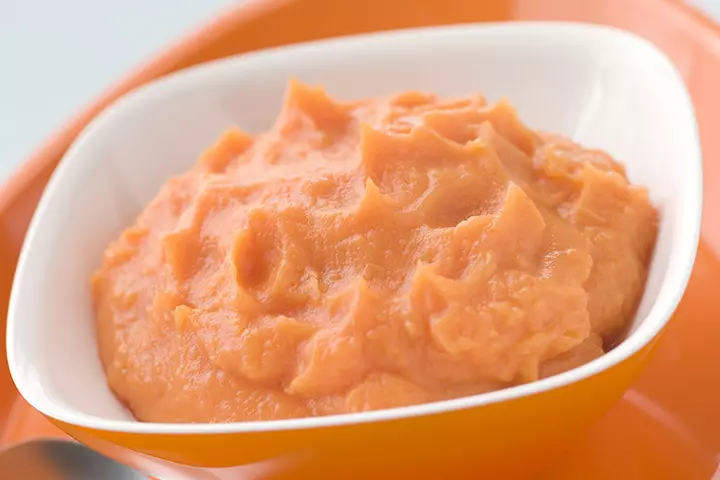
You will need:
- Sweet potato
- Water
How to:
- Preheat the oven to up to 200ºC. In the meantime, wash and scrub the sweet potatoes and poke holes in them. Do not skin them. Once the oven has attained the temperature, place the sweet potatoes on a baking tray and bake them for 45 minutes.
- Once they are baked, remove them from the oven and cut the sweet potato into two halves. Then gently scoop the pulp from the skin and put it in a blender. Add some water to homogenize and thin the consistency. Blend this mixture, and your homemade sweet potato puree will be ready.
- You can even steam the sweet potatoes instead of baking them. To steam them, peel the sweet potatoes and dice them into small pieces. Put them in a pan with water that submerges them halfway. Cover the pan with a lid and steam them on a stove for 30 minutes or until they become completely tender. Strain the excess water, put the steamed sweet potatoes in a blender, and proceed with the blending process as mentioned in the step.
2. Sweet potato apple puree
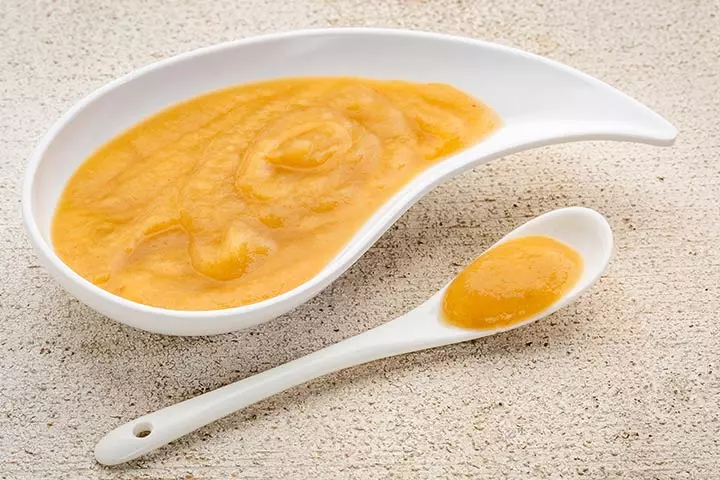
You will need:
- Apples
- Sweet potato
- Water
How to:
- It is a simple and easy homemade sweet potato recipe with the added advantage of apples. Bake or steam the apples and the sweet potatoes. You can cook them together.
- Put the pulp in the blender. In the case of apples, you need not remove the skin since it has a lot of nutrition. But make sure you blend the mixture well so that there is no coarse skin left in the puree. Use water to thin the consistency.
- Once blended, feed this delicious puree to your bundle of joy.
3. Sweet potato and chicken puree
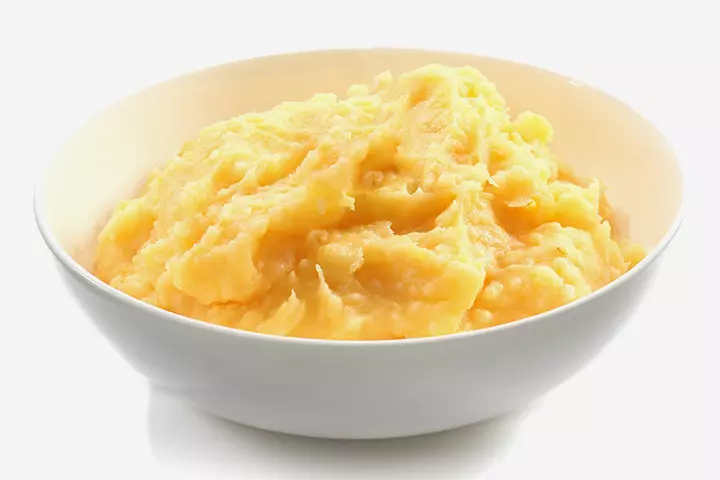
You will need:
- Fresh boneless chicken
- Sweet potato
How to:
- Boil boneless chicken and sweet potatoes separately. You must boil them till they are soft and cooked well. Do not throw away the chicken stock since it can be used later.
- Peel the sweet potatoes and slice them into small pieces. Put it in a blender along with the chicken pieces. Pour some chicken stock to thin the consistency and blend this mixture.
- Once it has been blended well, pour this puree into a bowl and your homemade sweet potato and chicken baby food is ready.
4. Sweet potato and peas puree
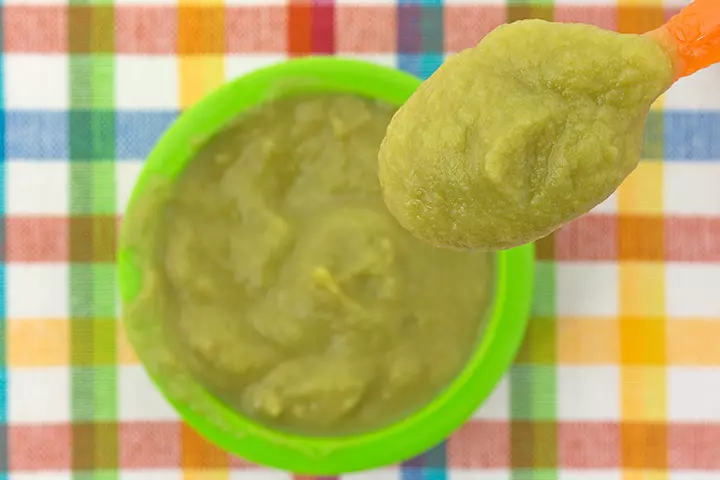
You will need:
- Sweet potatoes
- Peas
- Apple sauce (optional)
- Water
How to:
- Take some cooked sweet potato pulp along with boiled peas and put them in the blender.
- Blend them till they reach a homogeneous texture. You can add applesauce to sweeten since peas can be very bland in taste.
- Use water to thin the consistency and once done you have some healthy sweet potato and peas baby food ready for your little one.
This is a quick, nutritious recipe, which can come in very handy, especially if the little one is hungry at night.
5. Sweet potato and carrot puree
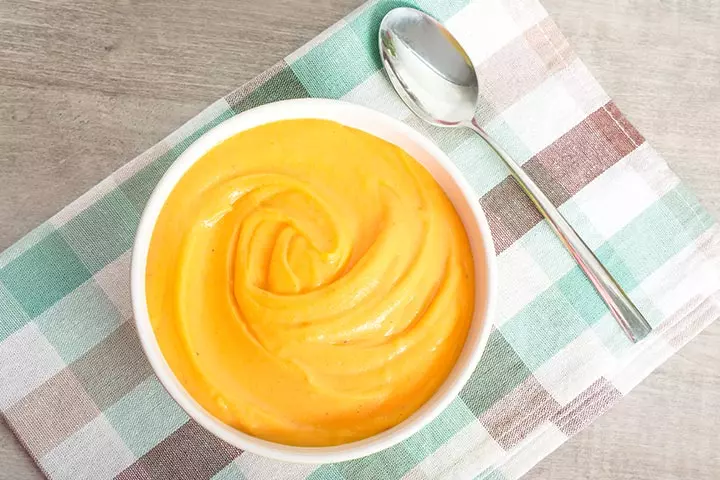
You will need:
- Sweet potatoes
- Carrots
- Water
How to:
- This amazingly simple sweet potato baby food recipe can be made in combination with another vegetable. In this case, we use carrots. You start by grating the carrots and cutting them into small pieces. Cook them with sweet potatoes in a pan of water until they are completely steamed.
- Put the cooked carrots and sweet potatoes in a blender. Use the vegetable stock to thin the liquid. You could also use water to do so. Blend the mixture until the desired consistency is achieved.
- You can serve the sweet potato and carrot puree as a dinner or lunch food item to your baby thanks to its high nutritional value.
Other Sweet Potato Recipes
Below are more great ways of feeding the sweet vegetable to your little one!
6. Sweet potato mash for babies
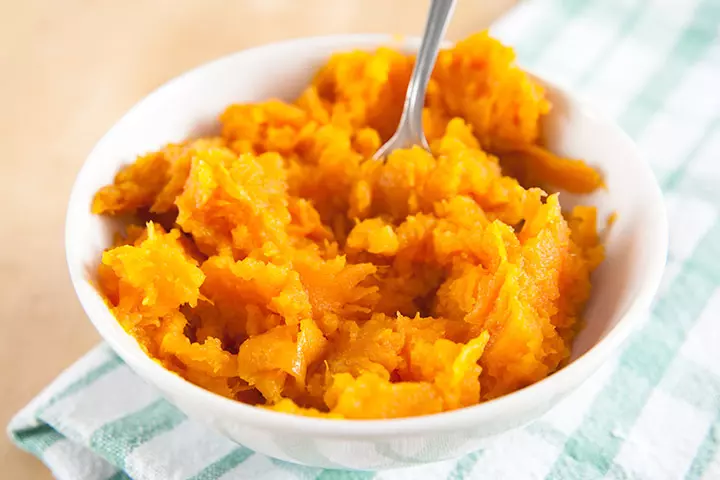
Ideal for age:
Six months and above
You will need:
- Sweet potatoes
- Water
How to:
- Sweet potato mash is great when your baby is getting a significant chunk of nutrition from solid food. The first step here in this recipe is exactly the same as mentioned in sweet potato puree. This means you either bake the sweet potatoes or steam them to cook the pulp.
- Once the baked/steamed sweet potato pulp is ready, you mash it using a masher or a spoon. Add some water to thin the consistency but do not add a lot since you would like the sweet potatoes to retain their solidity.
- Once they are mashed with a few large lumps, you can feed it to your little one.
7. Sweet potato and banana mash
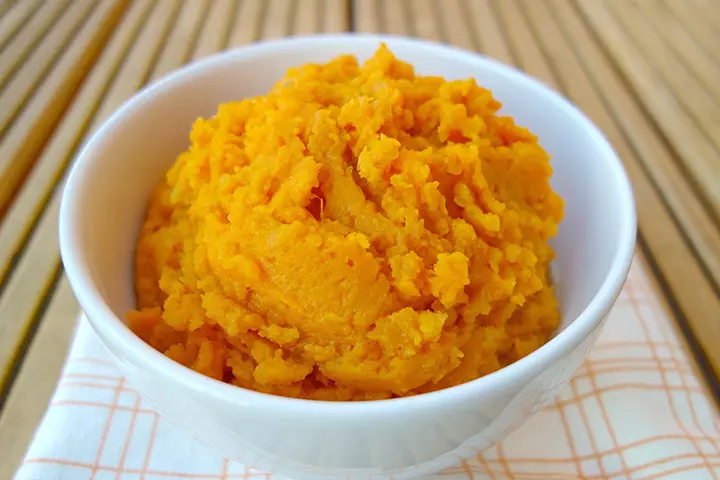
Ideal for age:
6 months and above
You will need:
- Sweet potatoes
- Bananas
- Water
How to:
- Bake or steam the sweet potato pulp and add it to a dish with finely-chopped banana pieces. Mash this mixture and use water to thin the consistency.
- Once mashed, the sweet potato and banana baby food is ready. You can also puree this mixture if your baby loves purees over mash.
8. Sweet potato and chicken soup
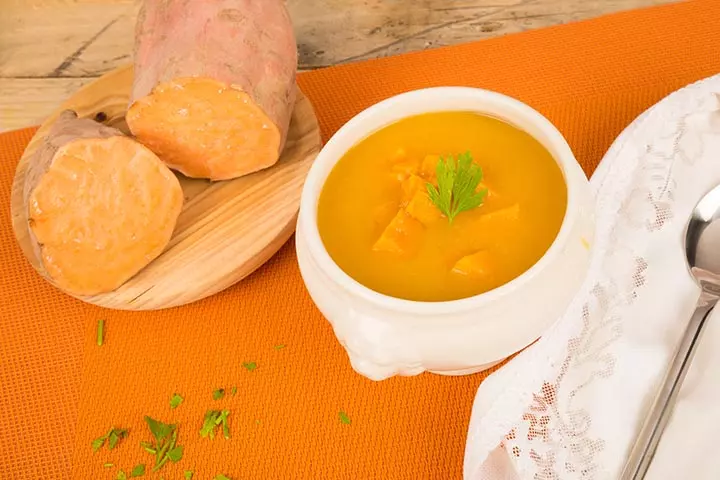
Ideal for age:
8 months and above
You will need:
- 100g minced chicken
- 5 cups water
- 1 cup cooked sweet potato
How to:
- Cook the minced boneless chicken with water in a cooking pot to make a chicken broth. Keep cooking till the chicken is tender enough. Do not strain the water.
- Take one cup of baked or steamed sweet potato pulp and put it into a blender. Pour the chicken broth and blend the mixture till the desired consistency of the soup is achieved. In case you would like to dilute the liquid, then add freshly boiled water to the blender.
- Once done, pour the soup into a bowl and serve it to your little one. This makes a wonderful sweet potato baby food recipe for your weaned little one when he is still in love with a liquid-based diet.
9. Sweet potato porridge
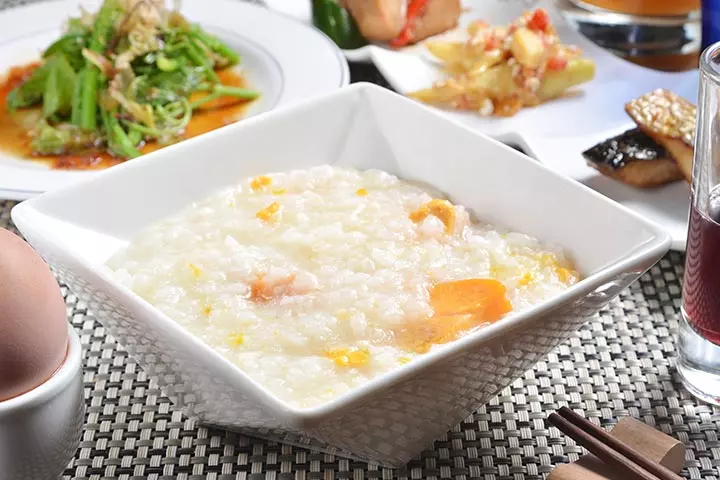
Ideal for age:
12 months and above
You will need:
- 1 cup rice
- 4 sweet potatoes
- 3 cups water
- 1 cup milk
How to:
- Porridge can be made with any grain but rice is easy to digest, therefore, we use rice here. Put one cup of washed rice in a cooking pot. Peel some sweet potatoes and dice them into small pieces. Add these pieces to the rice.
- Add three cups of water and one cup of milk to the cooking pot and cook the mixture. Bring the mixture to a boil and simmer for 10-15 minutes.
- You can add more milk to make the porridge more palatable to the baby. Once the ingredients are well-cooked you can serve this delicious porridge to your baby.
10. Sweet potato pancake
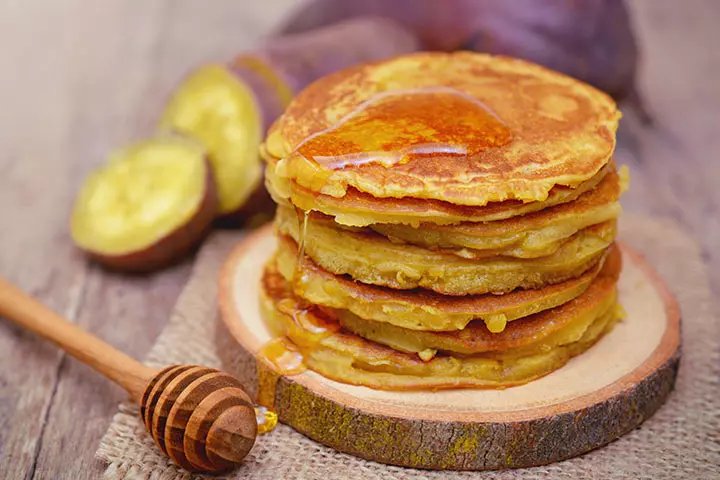
Ideal for age:
18 months and above
You will need:
- 2 tbsp fresh unsalted and melted butter with no preservatives
- ½ cup mashed steamed or baked sweet potatoes
- 1 egg
- ⅓ cup all-purpose flour
- ½ tsp baking powder
- ¼ cup milk
How to:
- Start by mixing sweet potato, egg, flour, and baking powder in a mixing bowl and stir them well.
- You then add the milk and one tablespoon of butter and stir the mixture properly. The consistency should be thick but without any lumps.
- Take a deep non-stick pan and add the remaining tablespoon of butter to it. Once the butter is a bit warm add the batter to the pan and cook it till you see bubbles coming out of it. Remember, to pour the batter in uniform layers for more symmetrical pancakes.
- Flip the pancake and cook the other side for two minutes.
- Once done, put the pancakes on a plate and wait for them to cool down till they are at a comfortable temperature for your baby to munch on.
11. Sweet potato puffs
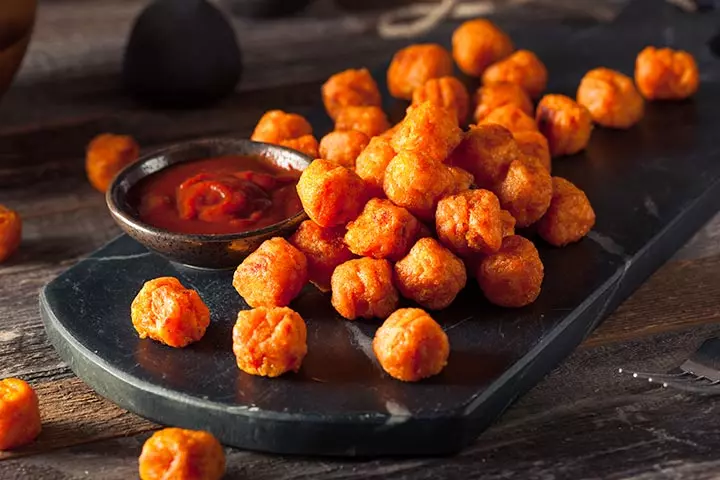
Ideal for age:
18 months and above
You will need:
- 4 cups cooked and mashed sweet potatoes
- 3 tbsp vegetable oil
- 2 tbsp water
- 1 tbsp fresh apple sauce
- 1 cup baby cereal
- ½ cup flour
How to:
- Take the mashed sweet potatoes, oil, apple sauce, and water and pour them into a mixing bowl. Stir the mixture well.
- Add baby cereal and flour to this mixture. You can add extra baby cereal in case you want the batter to be coarse. Once you are done mixing, the sweet potato dough will be ready.
- Wrap the dough in a cookie sheet or a clear plastic sheet to make a dough cone. Cut the tip of the sheet from where you pour small drop-shaped servings. Take each serving and roll them into a ball, between your palms. Once done, make a small hole with your finger at the center of the ball to leave an air bubble thus giving it a puff-like appearance. Place each puff, with the hole side down, on the baking tray. You can grease the baking tray with a touch of vegetable oil to prevent the baked nuggets from sticking to the tray.
- Preheat the oven to 350ºC and bake the puffs for 15 minutes. Shorten the baking time if you want the puffs to be soft and chewy. Let them cool a bit before your baby eats them.
12. Sweet potato wedges or fries
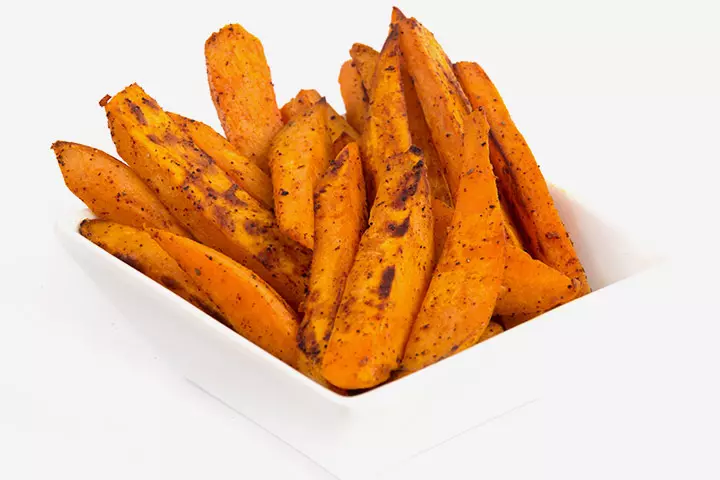
Ideal for age:
18 months and above
You will need:
- Sweet potatoes
- Vegetable oil
- Baby cereal (optional)
How to:
- Peel the sweet potatoes and cut them into wedge or fries-like shape. You then have two options – either use these wedges as it is or coat them with a layer of baby cereal. A coat of baby cereal can help make the wedges more chunky.
- Preheat the oven to 200ºC. Grease a baking tray with a bit of vegetable oil and place the coated or uncoated sweet potato wedges in it. Drizzle some vegetable oil on the wedges and bake them for 35 minutes.
- You can bake them for longer in case you want a crispier texture. Let the wedges cool before your baby enjoys them. You make sweet potato fries for a baby in the same manner. All you have to do is cut the sweet potatoes in the shape of fries. Sweet potato chips and sticks are made the same way by just cutting them in different ways.
You can feed these sweet potato baby food preparations whenever you like. There are other ways of feeding sweet potato to your baby, by combining it with vegetables and cereals.
Sweet Potato Food Combinations For Babies
Some foods can taste great when in combination with sweet potato. Take the advantage of its sweetness and combine these foods to make them more palatable to your little one.
- Vegetables: Babies may find vegetables bland therefore mix them with sweet potato to sweeten the taste. You can use any vegetable like beans, carrots, peas, pumpkin, bottle gourd, etc.
- Baby cereals: Mix some baby cereal with sweet potato, and you will find the plate gets licked clean. You can mix cereals made from any grain like rice, barley, and oats.
- Non-vegetarian food items: Non-vegetarian food can be a hit or a miss when you feed them to your baby for the first time. To ensure he loves that meat stock and gets all its vital nutrients, mix it with some mashed sweet potatoes to add a tinge of sweetness to it.
- Yogurt: Yogurt and sweet potato work great together especially when the sweet potatoes are mashed.
- Fruits: Of course, fruits of any kind can be mixed with sweet potato to enhance the taste. Mix sweet potatoes with fruit purees for babies to bump up their natural sweetness and make your baby relish them more.
Can A Baby Be Allergic To Sweet Potato?
Just like any other food, a baby may be allergic to sweet potatoes, too (9). However, the chances are fewer than in other vegetables such as carrot and spinach (which are also good sources of beta-carotene). Therefore, always be on the lookout for the following symptoms after giving your baby sweet potato for the first time. These symptoms may appear minutes to hours after the consumption of a food allergen:
- Skin hives: Small reddish bumps on the skin quite often seen in clusters
- Shortness of breath: There will be a general feeling of breathlessness, and the baby may wheeze and gasp for air.
- Abdominal pain: Pain could be accompanied by vomiting and diarrhea
- Swelling of mouth: Lips and tongue will appear swollen along with swelling in neck muscles that may cause severe discomfort during swallowing.
- General weakness and dizziness: The baby will appear dizzy and may suddenly seem fatigued and weak as an effect of the food allergy.
 Point to consider
Point to considerFrequently Asked Questions
1. Are sweet potatoes a choking hazard for babies?
Well-cooked sweet potatoes aren’t usually a choking hazard. However, it may pose a choking risk if the baby is served sweet potato puree/mash with lumps or undercooked bite-sized pieces. Ensure that the sweet potato is well-cooked and soft before serving it to the baby.
2. Do sweet potatoes constipate babies?
Sweet potato is a fibrous vegetable and helps relieve constipation. However, excess fiber intake may have opposite effects since it may increase the chances of constipation. Add small quantities of sweet potatoes to a baby’s meal rather than adding too much of it at once (10).
3. Does sweet potato make babies gain weight?
Sweet potatoes are a rich source of starch (carbohydrate) and other nutrients that may contribute to a baby’s weight gain. You may add sweet potatoes to your baby’s diet in moderation to meet their energy and nutritional needs. Ask the pediatrician or dietitian to incorporate sweet potatoes into your baby’s diet depending on their energy (calorie) needs (11).
4. Are sweet potatoes easy for babies to digest?
Sweet potatoes are rich in fiber, and fibers are not digested by the digestive tract (12). Fibers could prevent constipation if taken in required amounts. Giving sweet potatoes in larger quantities may cause digestive problems in babies since their digestive system is still developing.
5. Do sweet potatoes give babies gas?
Most starches, including sweet potatoes, can make gas when digested in the intestines. You may give sweet potatoes in small quantities to avoid bloating in babies (12).
6. Can I microwave sweet potatoes for my baby?
You can safely microwave sweet potatoes. You may prick the potatoes, add ¼ cup of water, cover the tray, and microwave for three minutes. Turn the potato on the other side, cover, and microwave for three to six minutes. Cool down and peel the potatoes to prepare puree or mashed potatoes. Add a few spoons of water to make it smoother and less sticky (13).
Incorporate sweet potatoes for babies as a part of their weaning diet. This vitamin and carbohydrate-rich veggie could offer many health benefits and enhance the nutritional value when included in your baby’s routine diet. You may store them for a long time and add them in mashed forms along with other vegetables for babies to prepare yummy purees or soups as per your infant’s taste preferences. However, be careful about any allergies or reactions and take your baby to a pediatrician if they have any discomfort after consuming sweet potatoes.
Infographic: Precautions While Giving Sweet Potato To Babies
Sweet potatoes are a healthy finger food choice for your baby and can provide several nutrients to a weaning infant. But there are certain points that you need to consider before introducing them. Go through this infographic for more information about the same. Illustration: Momjunction Design Team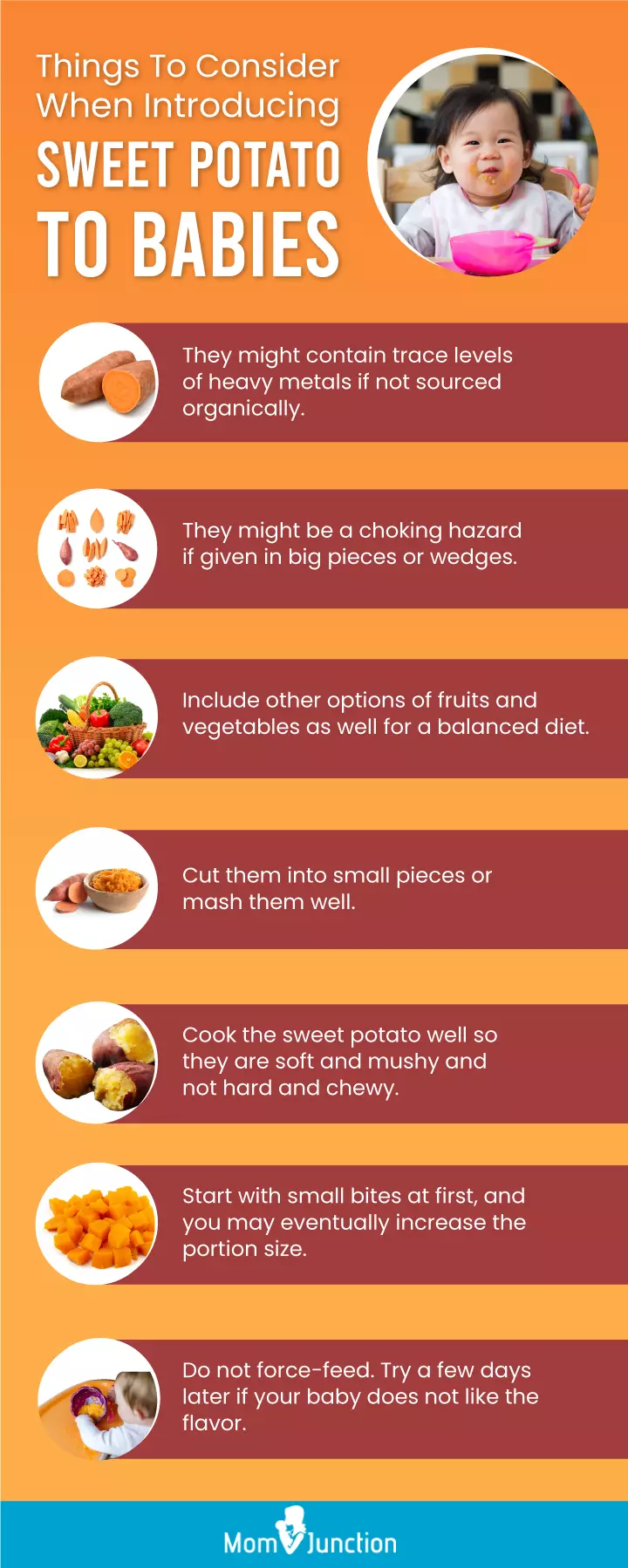
Illustration: Sweet Potato For Baby: Its Benefits And 12 Tasty Recipes To Try

Image: Stable Diffusion/MomJunction Design Team
Learn how to make sweet potatoes for your baby with this easy baby-led weaning recipe! Perfect for introducing your little one to solid foods, this baby food recipe is nutritious.
References
- Vegetable of the month: Sweet potatoes.
https://www.health.harvard.edu/heart-health/vegetable-of-the-month-sweet-potatoes - Introducing Solid Foods to Infants.
https://extension.colostate.edu/topic-areas/nutrition-food-safety-health/introducing-solid-foods-to-infants-9-358/ - Technical Compendium: Descriptive Agricultural Statistics and Analysis for Zambia in Support of the USAID Mission’s Feed the Future Strategic Review.
https://ageconsearch.umn.edu/nanna/record/104016/files/wp52.pdf?withWatermark=0&withMetadata=0®isterDownload=1&version=1 - Sweet potato raw unprepared FDC ID: 168482.
https://fdc.nal.usda.gov/fdc-app.html#/food-details/168482/nutrients - Nutrition Tips for Relieving Constipation; Eat Right; Academy of Nutrition And Dietetics
https://www.eatright.org/health/health-conditions/digestive-and-gastrointestinal/nutrition-tips-for-relieving-constipation - Flora C. Amagloh et al.; (2021); The Potential of Sweetpotato as a Functional Food in Sub-Saharan Africa and Its Implications for Health: A Review.
https://www.ncbi.nlm.nih.gov/pmc/articles/PMC8156662/ - Dietary Guidelines For Americans 2020-2025.
https://www.dietaryguidelines.gov/sites/default/files/2020-12/Dietary_Guidelines_for_Americans_2020-2025.pdf - Breastfeeding.
https://www.who.int/news-room/questions-and-answers/item/breastfeeding - CPMC Food Allergy Care.
https://www.sutterhealth.org/cpmc/services/allergy/food-allergy - Improving Your Health With Fiber.
https://my.clevelandclinic.org/health/articles/14400-improving-your-health-with-fiber - Paediatrics – How to gain weight in babies.
https://www.uhcw.nhs.uk/download/clientfiles/files/Patient%20Information%20Leaflets/Clinical%20Support%20Services/Dietetics/Paediatrics%20-%20How%20to%20gain%20weight%20in%20babies%20.pdf - Foods that May Cause Gas.
https://iffgd.org/gi-disorders/symptoms-causes/intestinal-gas/foods-that-may-cause-gas/ - Sweet Potato Puree (Baby Food).
https://eatfresh.org/recipe/sweet-potato-puree-baby-food/ - Man Liu et al.; (2020); Dietary fiber isolated from sweet potato residues promotes a healthy gut microbiome profile.
https://pubmed.ncbi.nlm.nih.gov/31909777/ - Food Protein-Induced Enterocolitis Syndrome.
https://rarediseases.org/rare-diseases/food-protein-induced-enterocolitis-syndrome/
Community Experiences
Join the conversation and become a part of our nurturing community! Share your stories, experiences, and insights to connect with fellow parents.
Read full bio of Huda Shaikh
Read full bio of Swati Patwal
Read full bio of Rohit Garoo
Read full bio of Ghazia Shah










